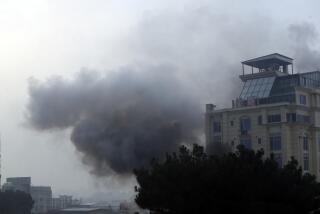Judge says detainee in Afghanistan may seek freedom
A federal judge in Washington on Wednesday upheld the right of a Yemeni man held as an enemy combatant at a U.S. military prison in Afghanistan to seek his freedom.
The ruling is the first issued in a case filed on behalf of a foreign detainee held by the U.S. outside the country or the Guantanamo Bay Naval Station. It comes less than a month after the Supreme Court said it would again consider the rights of detainees at Guantanamo in the fall.
U.S. District Judge John D. Bates cited the high court’s June action as a key reason for his decision.
Wednesday’s ruling stems from a case filed in September on behalf of Fadi Al Maqaleh, who is being held at the military prison in Bagram, Afghanistan. The International Justice Network, a legal advocacy group, filed a habeas corpus petition seeking Maqaleh’s release, alleging that he had been illegally taken into custody by the U.S. and held without charges for more than five years.
Bates, appointed to the court by President Bush, said it was possible that when the Supreme Court considered the rights of detainees in the fall, it “could issue a broader decision in favor of the detainees, one whose reasoning applies not just to Guantanamo, but to Bagram and other locations as well.”
He also acknowledged that the high court could go the other way. Whatever the justices decide, the ruling is likely to affect the outcome of Maqaleh’s case and thus it should not be dismissed before the Supreme Court weighs in, Bates said.
Attorney Tina M. Foster said she filed the case after meeting Maqaleh’s father, Ahmad Al Maqaleh, while she was in Yemen doing research for detainees at Guantanamo. “A lot of families came to me saying there were worse problems at Bagram than at Guantanamo,” Foster said, referring to the military base about 40 miles north of Kabul where about 650 detainees are being held.
She said Maqaleh’s family told her that they had not seen their son in nearly five years and that they only learned that he was being held at Bagram when they got a letter from him, via the International Committee of the Red Cross, “in or about 2003.”
Foster said she believed that Maqaleh, who is now about 25, had never been part of forces hostile to the United States.
She asked Judge Bates to issue a writ of habeas corpus compelling the government to either release Maqaleh or establish in court a legal basis for detaining him.
“Both military personnel and former detainees have described the prison conditions at Bagram to be far worse than those at Guantanamo,” Foster said. Among other sources, she quoted a Defense Department official who had toured the facility and a report by Human Rights Watch, which said “the detention system in Afghanistan, unlike the system in Iraq, is not operated even nominally in compliance with the Geneva conventions.”
She also quoted articles from several publications in which former detainees told journalists of abusive interrogation methods and harsh conditions at Bagram, including one man who described his cell as a cage like ones he had seen for keeping animals in the Karachi, Pakistan, zoo.
Justice Department attorney Jean Lin countered that Judge Bates had no jurisdiction to hear the case, even if Foster’s allegations were true. She cited a February 2007 decision by the U.S. Court of Appeals in Washington in Boumediene vs. Bush, holding that federal courts have no jurisdiction over habeas corpus petitions filed by aliens abroad and detained as enemy combatants in a military base outside sovereign U.S. territory.
The D.C. Circuit said the Military Commissions Act of 2006, which precludes claims based on the Geneva Convention, left no other ruling possible. Lin also said that a 1950 Supreme Court decision held that aliens detained abroad by the United States had no constitutional rights.
According to Lin’s brief, Maqaleh was captured in Zabul, Afghanistan, though it did not say when. The brief states that Maqaleh was “determined to be an enemy combatant both at the time of the capture and in subsequent reviews,” with the most recent being on March 1.
--
More to Read
Sign up for Essential California
The most important California stories and recommendations in your inbox every morning.
You may occasionally receive promotional content from the Los Angeles Times.










